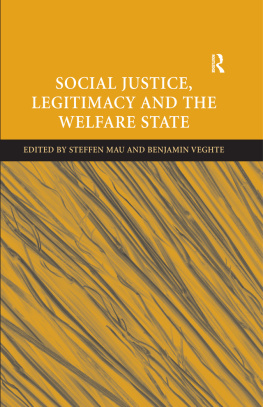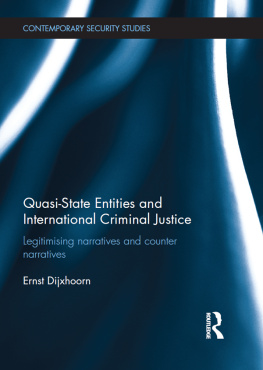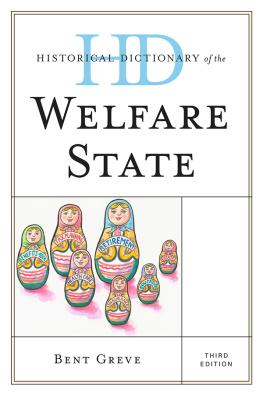First published 2007 by Ashgate Publishing
Published 2016 by Routledge
2 Park Square, Milton Park, Abingdon, Oxon OX14 4RN
711 Third Avenue, New York, NY 10017, USA
Routledge is an imprint of the Taylor & Francis Group, an informa business
Copyright 2007 Steffen Mau and Benjamin Veghte
Steffen Mau and Benjamin Veghte have asserted their right under the Copyright, Designs and Patents Act, 1988, to be identified as the editors of this work.
All rights reserved. No part of this book may be reprinted or reproduced or utilised in any form or by any electronic, mechanical, or other means, now known or hereafter invented, including photocopying and recording, or in any information storage or retrieval system, without permission in writing from the publishers.
Notice:
Product or corporate names may be trademarks or registered trademarks, and are used only for identification and explanation without intent to infringe.
British Library Cataloguing in Publication Data
Social justice, legitimacy and the welfare state
1. Welfare state 2. Social policy
I. Mau, Steffen, 1968- II. Veghte, Benjamin
330.1'26
Library of Congress Cataloging-in-Publication Data
Social justice, legitimacy and the welfare state / edited by Steffen Mau and Benjamin Veghte.
p. cm.
Includes bibliographical references and index.
ISBN 978-0-7546-4939-7
1. Welfare state. 2. Social justice. 3. Welfare state--Europe. 4. Welfare state--Europe--Case
studies. 5. Welfare state--United states. I. Mau, Steffen, 1968- II. Veghte, Benjamin.
JC479.S6216 2007
361.6'5--dc22
2007002016
ISBN 9780754649397 (hbk)
Transfered to Digital Printing in 2016
Bernhard Christoph is a researcher at the Institute for Employment Research (IAB) in Nrnberg, Germany. His research interests include welfare state research, social indicators research, social policy and social inequality. His publications include: 'Die gesellschaftliche Akzeptanz der Sozialhilfe. Eine Untersuchung aus moralkonomischer Perspektive' (with Sachweh and Ullrich, 2006), Klner Zeitschrift fr Soziologie und Sozialpsychologie 58:3, 489509; 'Shaky Attachments: Individual-level stability and change of partisanship among West German voters. 19842001' (with Schmitt-Beck and Weick, 2006), European Journal of Political Research 45:4, 581608; and 'Subjective well-being in the European Union during the 90ies' (with Noll, 2003), Social Indicators Research, 64:3, 521546.
Anton Derks is a Guest Professor at the Sociology Department of the Vrije Universiteit Brussel. His main research areas are sociology of culture and political sociology. He has published widely on sociological themes including individualism, the consequences of unemployment, ideological and religious beliefs, the crisis of political legitimation, civil society, social cohesion, gender, education and sociopolitical attitudes. His most recent work examines public support for the welfare state in relation to social class, ideology and voting behaviour. Recent publications include 'Are the Underprivileged Really That Economically "Leftist"? Attitudes Towards Economic Redistribution and the Welfare State in Flanders' (2004). European Journal of Political Research 43:4, 509522; Individualism Without Defence (VUBpress, 2000); and Farewell to the Leftist Working Class (with Houtman and Achterberg, forthcoming.)
Knut Halvorsen works in the field of comparative social policy, unemployment, marginalization, social exclusion and social attitudes. He is Professor of Social Policy/ Social Work at the Faculty of Business, Public Administration and Social Work, affiliated with the Social Welfare Research Centre, Oslo University College, Norway. He has published on the issues of welfare state legitimacy, social participation, and unemployment. Knut Halvorsen is co-editor and contributor to several edited books on unemployment and citizenship, and his current publication analyzes the legitimacy of welfare states in cultural transition Recent publications include 'Solidarity and the Legitimacy of the Welfare State: Attitudes to Abuse of Welfare Benefits in the Scandinavian Countries and Social Participation in the Nordic Countries: Included Through Paid Work or Excluded Through Welfare State Arrangements?' in J.G, Andersen and Halvorsen (eds.) (forthcoming), Unemployment and Citizenship: Marginalisation and Integration in the Nordic Countries ; and 'Changing Labour Markets, Unemployment and Unemployment Policies in a Citizenship Perspective' (with Andersen) in Andersen, Clasen, Halvorsen and van Oorschot (eds.) (2002), Europe's New State of Welfare.
Mads Meier Jger is a PhD candidate at the Danish National Institute of Social Research and the Department of Sociology at the University of Copenhagen, Denmark. His research interests include comparative welfare state research, social mobility and quantitative methods, and his dissertation analyses intergenerational educational mobility in the Scandinavian context. He has published in the field of welfare state legitimacy, social mobility, inequality and research methods. Recent publications include 'Welfare Regimes and Attitudes towards Redistribution: The Regime Hypothesis Revisited' (2006), European Sociological Review 22:2, 157170; and 'What Makes People Support Public Responsibility for Welfare Provision: Self-interest or Political Ideology? A Longitudinal Approach' (2006), Acta Sociologica 49: 321338.
Staffan Kumlin is a Hans Meijer Pro Futura Fellow at the Department of Political Science, Gteborg University. He studies comparative political behaviour and public opinion, with a current focus on 'Political Accountability in European Welfare States'. He is the author of The Personal and the Political: How Personal Welfare State Experiences Affect Political Trust and Ideology (Palgrave-Macmillan 2004), as well as articles in journals such as Comparative Political Studies, Journal of Public Policy , and European Journal of Political Research. He has been a Visiting Fellow at the Social Science Research Center, Berlin (WZB), and the Robert Schuman Centre for Advanced Studies, European University Institute, Florence. Kumlin's research is supported financially by The Bank of Sweden Tercentenary Foundation, The Swedish Council for Working Life and Social Research, and The Swedish Collegium for Advanced Study in the Social Sciences (SCASSS).
Stefan Liebig is Professor of Sociology (Social Inequality and Stratification Research) at the University of Duisburg-Essen. He works in the fields of empirical justice research, sociology of organizations and social stratification. He has published widely on citizens' attitudes towards social justice. Some recent publications include 'Just Taxation? Evaluating One's Own Tax Burden' (with Mau, 2005), Public Policy Research 12:2, 93101; 'A Legitimate Guaranteed Income?' in Promoting Income Security as a Right: Europe and North America (with Mau, 2004), edited by G. Standing; and 'Lessons from Philosophy? Interdisciplinary Justice Research and Two Classes of Justice Judgments' (2001), Social Justice Research 14:3, 265287.
Steffen Mau is Professor of Political Sociology and Director of the Graduate School of Social Sciences (GSSS), University of Bremen, Germany. He works in the fields of comparative welfare research, social inequality, transnationalization and European integration. Recent publications include The Moral Economy of Welfare States. Britain and Germany Compared (Routledge, 2003); Gerechtigkeit und Verteilugsprobleme in modernen Gesellschaften (edited with Liebig and Lengfeld, Campus, 2004); Vom Geben und Nehmen. Zur Soziologie der Reziprozitt (edited with Adloff, Campus, 2005), and Welfare States: Construction, Deconstruction, Reconstruction (three volumes, edited with Leibfried, Elgar, 2007).











